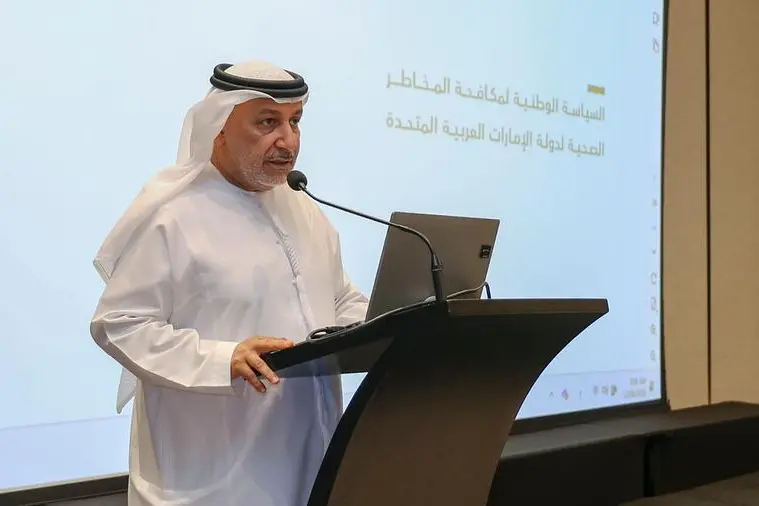PHOTO
- Workshop to launch the “National Policy for Combating Health Risks” and to establish the policy's executive framework.
- Coordination at all levels through building effective national partnerships and networks and international cooperation.
- His Excellency Al Olama: The policy's focus on good governance and institutional empowerment constitutes a fundamental pillar for establishing comprehensive national health security.
UAE, Dubai: The Ministry of Health and Prevention held a workshop titled "Launching the National Policy for Combating Health Risks in the UAE." The workshop was attended by broad participation from relevant stakeholders, including health authorities and other entities. The aim was to introduce its pillars following its approval by the UAE Cabinet. The workshop also discussed the framework of the executive plan emanating from the policy and enhanced coordination among all relevant partners to ensure integrated efforts related to combating health risks and to ensure the achievement of the policy's vision and objectives. This will contribute to adopting a multi-sectoral approach to health risk preparedness and response, meeting the aspirations of the UAE Centennial 2071 vision.
Wide Participation
The workshop was opened by His Excellency Dr. Salem Al Darmaki, Advisor to the Minister of Health and Prevention, with the participation of representatives from the National Emergency, Crisis and Disaster Management Authority, the Presidential Court, the Ministry of Interior, the Ministry of Climate Change and Environment, the Ministry of Economy, the Ministry of Energy and Infrastructure, the Federal Authority for Identity and Citizenship, Customs and Ports Security, the General Civil Aviation Authority, the Federal Authority for Nuclear Regulation, the Department of Health - Abu Dhabi, the Emirates Health Services Corporation, the Emirates Drug Establishment, the Dubai Health Authority, the Sharjah Health Authority, Dubai Health, the United Arab Emirates University, and the Emirates Medical Association.
Risk Response System
The workshop focused on governance frameworks for combating health risks, including building and supporting social, financial, and administrative commitment; coordination at all levels through building effective national partnerships and networks and international cooperation; developing supportive policies and legislation; integrating health into all policies; and mechanisms for managing health risks at all stages, including: Prevention, preparedness, response, and recovery are achieved through monitoring the implementation of the National Framework for Health Risk Management, identifying, analyzing, assessing, and providing early warning of risks, as well as ensuring response and control of the health situation in cases of exposure to health risks and emergencies.
Future Planning
The workshop addressed strengthening sustainable basic health infrastructure and logistics, maintaining essential and vital health services during health emergencies, ensuring the availability of a sufficiently qualified health workforce, developing interventions for effective response to risk communication, addressing rumors, and providing and analyzing risk data and statistics for evidence-based decision-making. It also focused on strengthening research capacity, establishing systems, and managing innovation in the field of various health risks. It also identified the most important expected improvements in the health sector and beyond it, and developing a future planning process for health risk management.
A Proactive Vision
His Excellency Dr. Mohammed Salim Al Olama, Undersecretary of the Ministry of Health and Prevention, emphasized that the National Policy for Combating Health Risks in the UAE represents a strengthening of the national response system to health emergencies. This embodies a proactive vision that aligns with the aspirations of wise leadership and the UAE government's ambitions to continuously develop a health sector capable of containing emerging challenges and responding quickly to health crises and emergencies.
His Excellency added: "The Ministry operates within a coordinated framework with all government, private, and academic entities, both local and international, within a framework that enhances the integration of roles and establishes a legislative and executive environment capable of achieving sustainable results. Furthermore, the policy's focus on good governance, institutional empowerment, and improving infrastructure efficiency constitutes a fundamental pillar for establishing comprehensive national health security by consolidating the role of community participation as a strategic tool for early detection, disease prevention, and achieving comprehensive preparedness that ensures the continuity of vital services under various circumstances, thus achieving the Ministry's strategy 2023-2026.
Dr. Lubna Al Shaali, Director of the Health Policy and Legislation Department at the Ministry of Health and Prevention, indicated that implementing the National Policy for Combating Health Risks will contribute to providing proactive guidance for developing the national capabilities needed to respond to various events and risks and combat their health impacts, in accordance with the latest global and national health practices and guidelines. This will also promote more resilient health systems capable of adapting to future crises through a national framework that consolidates integration among agencies and unifies efforts. She noted that this policy represents a strategic step toward building a robust health system, centered on health in all policies, and aligned with the Ministry's strategy to achieve comprehensive and sustainable health security.
Dr. Fatima Al Attar, Director of the International Health Regulations Office at the Ministry of Health and Prevention, indicated that accurate periodic assessment of health risks by strengthening monitoring and early detection systems, classifying these risks, and identifying their sources will enhance preparedness, improve response indicators, reduce mortality and morbidity rates associated with health emergencies and disasters, and enhance the continuity of health coverage in the country.




















